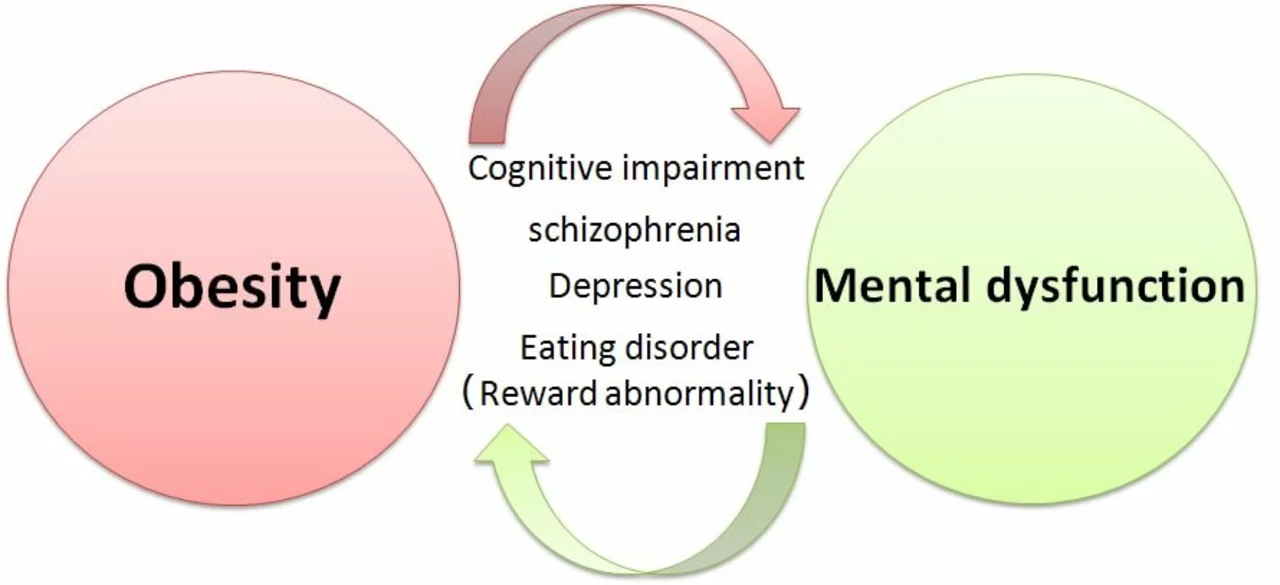Understanding the Connection Between Obesity and Mental Health
As a blogger who is concerned about the well-being of my readers, I feel it is necessary to address an increasingly prevalent issue in our society: the link between obesity and mental health. In this article, I will delve into the complex relationship between these two factors and explore the reasons why this growing concern needs to be addressed. So, let's begin by understanding the connection between obesity and mental health.
Obesity is a complex health issue that affects millions of people around the world. According to the World Health Organization, obesity has nearly tripled worldwide since 1975. This alarming increase has led to a growing concern about the myriad physical health issues related to obesity, such as heart disease, diabetes, and certain types of cancer. However, the impact of obesity on mental health is often overlooked, despite its potential to significantly affect a person's overall well-being.
Depression, Anxiety, and Obesity: The Vicious Cycle
One of the most common mental health issues linked to obesity is depression. Research has shown that individuals with obesity are more likely to experience depressive symptoms, with some studies suggesting that the prevalence of depression among people with obesity is as high as 30%. This relationship is thought to be bidirectional, meaning that obesity can lead to depression, and depression can lead to obesity.
Similarly, anxiety disorders have also been found to have a significant association with obesity. People with obesity may experience increased levels of anxiety due to various factors, such as societal stigma, discrimination, and negative self-image. Additionally, anxiety can exacerbate unhealthy eating habits and decrease physical activity levels, which can contribute to further weight gain.
This vicious cycle between obesity and mental health disorders can be challenging to break, making it essential to develop comprehensive strategies to address both physical and mental health aspects of obesity.
The Role of Stigma and Discrimination in Obesity and Mental Health
One of the key factors contributing to the link between obesity and mental health is the stigma and discrimination faced by individuals with obesity. This negative perception of people with obesity can come from various sources, including the media, healthcare professionals, and even family members and friends.
Experiencing stigma and discrimination can lead to feelings of shame, guilt, and low self-esteem, which can, in turn, contribute to mental health issues such as depression and anxiety. Moreover, the fear of being judged or ridiculed may prevent those with obesity from seeking help and support, further exacerbating the situation.
Addressing the stigma associated with obesity is crucial in breaking the cycle between obesity and mental health issues. This can be achieved by promoting a more inclusive and compassionate society that recognizes and supports people of all body sizes and shapes.
Improving Mental Health Through Lifestyle Changes
While it is essential to address the underlying causes of obesity, such as genetic and environmental factors, making lifestyle changes can also have a significant impact on both physical and mental health. For example, engaging in regular physical activity has been shown to improve mood, reduce anxiety, and increase self-esteem. Furthermore, making healthier food choices and practicing mindful eating can contribute to better mental health by reducing emotional eating and improving self-awareness.
It is important to remember that these lifestyle changes should be approached in a sustainable and realistic manner. Rather than aiming for drastic changes, focus on small, achievable steps that can be maintained over time. Additionally, seeking support from friends, family, or mental health professionals can be invaluable in maintaining motivation and accountability throughout this process.
Advocating for Comprehensive Obesity and Mental Health Care
As we've seen, the link between obesity and mental health is a growing concern that requires a multifaceted approach. One important aspect of this is advocating for comprehensive care that addresses both physical and mental health needs. This may involve increasing access to mental health services for those with obesity and promoting mental health screenings as part of routine healthcare visits.
Furthermore, healthcare professionals should be trained to recognize and address the unique challenges faced by individuals with obesity, including the impact of stigma and discrimination on mental health. By promoting a holistic approach to obesity and mental health care, we can work towards breaking the cycle between these two factors and improving overall well-being for those affected.
In conclusion, the link between obesity and mental health is a complex and concerning issue that needs to be addressed through a combination of research, advocacy, and compassionate care. By understanding the connection between these factors, we can work towards creating a more inclusive society and providing the support needed for those living with obesity and mental health challenges.


Alex Hughes
May 14, 2023 AT 13:34Hubert vélo
May 15, 2023 AT 20:44Kalidas Saha
May 17, 2023 AT 02:16Marcus Strömberg
May 17, 2023 AT 09:11Matt R.
May 18, 2023 AT 15:28Wilona Funston
May 19, 2023 AT 18:25Ben Finch
May 20, 2023 AT 17:39Naga Raju
May 21, 2023 AT 19:15Dan Gut
May 23, 2023 AT 09:07Jordan Corry
May 24, 2023 AT 16:13Mohamed Aseem
May 26, 2023 AT 00:02Steve Dugas
May 27, 2023 AT 00:17Paul Avratin
May 28, 2023 AT 02:08Brandi Busse
May 30, 2023 AT 01:36